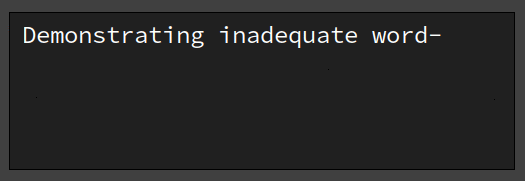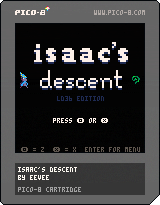September was continuing the three big things in particular, but, ah.
-
art: I finished a secret loophole commission that I can’t show yet; drew a birthday thing for someone; edited my avatar to be more seasonal; resolved to cross Inktober with daily Pokémon; and then was convinced to maybe try real ink instead. That’s a lot! Making up for not drawing anything for a couple weeks while I was obsessed with Isaac’s Descent, I guess.
-
doom: I spent a little more time fiddling with Sandy-styled maps while watching Liz Ryerson stream Doom stuff, but I still have my classic frustrating problems of drawing everything too small and not having a good idea for the overall shape/flow of the world. I also streamed a couple hours of exploring the new Oblige, which was interesting, at least to me.
-
blog: Some more progress towards upstreaming my fix for <summary> in Pelican Atom feeds. Started taking notes for a paid post. Worked on a MegaZeux post and wrote most of a Doom metrics one, but couldn’t finish either.
-
twitter: I wrote @calloutbot, which will either make perfect sense to you, or not.
I think I may have the flu, but without any respiratory symptoms. Just enough that I’m vaguely tired and sore and not quite able to plan larger stuff like, say, blog posts. Or Doom maps, perhaps. I spent several frustrating days wrangling with two different posts and not getting anywhere with either of them before I remembered a roommate had had the flu about one incubation period ago.
I am thus slightly behind on writing, and haven’t done much else mentally-intense either. It sucks and I’m annoyed, but I’m taking a few days off to draw and do other low-intensity stuff before I make a mad scramble to catch up.
Meanwhile, about those, um, three things. I slipped a bit. A lot.
-
Draft three chapters of this book, September: a second chapter
No, that didn’t happen.
But! I decided that Isaac’s Descent HD would make a really good final chapter, since it’s an entire real game written completely from scratch. That means it’s also going to be a whopper. I spent like a third of the month distracted by building Isaac’s Descent HD, which is a prerequisite for writing about how I built it, so that’s some really good progress nonetheless.
The game isn’t too far along from a player perspective, but I did a lot of engine work and took a lot of notes about it. And of course I took all those notes during Ludum Dare, which I can reverse-engineer into a PICO-8 chapter. So while there’s less visible progress than I wanted, I have a ton more stuff to work with now.
-
Get veekun beta-worthy, September: most games dumped; lookup; core pages working; new site in publicly-available beta
Ha ha none of this happened. I totally dropped the ball.
I did work on veekun, but I got caught up in dealing with encounters, and then my brain stopped working so good, so overall it didn’t make a whole lot of progress.
-
Runed Awakening, September: blah blah it doesn’t even matter
I didn’t touch Runed Awakening all month. Sob.
I should probably be learning a lesson here about biting off more than I can chew, but I adamantly refuse to learn anything.
It’s okay if new veekun isn’t done in time for Sun/Moon, which is looking like it’ll be the case — the old site layout and schema should still hobble along just fine as they are. It would’ve been a great time to breathe some life back into the site, is all. I’ll still try to get as much done as I can, so maybe there can still be a usable beta, but I don’t know what I can magic up in six weeks when I’m also doing several other things.
I don’t know what I’m going to do for October. I’ve got a lot of blogging to do now, I still want to find time to experiment with music, and I also want to do two ink drawings a day for Inktober.
Other than all that, I suppose I’ll still “focus” on these three big things and just see what happens.

![[articles]](https://eev.ee/theme/images/category-articles.png) Accessible games
Accessible games
![[updates]](https://eev.ee/theme/images/category-updates.png) Inktober
Inktober
![[dev]](https://eev.ee/theme/images/category-dev.png) Weekly roundup: Inktober 3: Tokyo Drift
Weekly roundup: Inktober 3: Tokyo Drift

